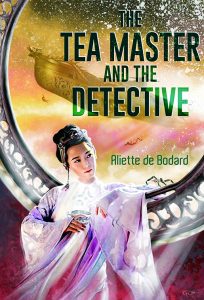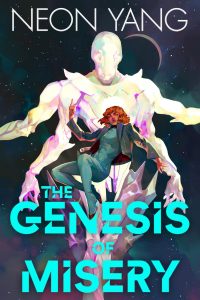Liz Bourke Reviews The Tea Master and the Detective by Aliette de Bodard
 The Tea Master and the Detective, Aliette de Bodard (Subterranean 978-1-59606-864- 3, $40.00, 96pp, hc). March 2018. Cover by Maurizio Manzieri.
The Tea Master and the Detective, Aliette de Bodard (Subterranean 978-1-59606-864- 3, $40.00, 96pp, hc). March 2018. Cover by Maurizio Manzieri.
Aliette de Bodard’s The Tea Master and the Detective is a new story set in her Xuya universe. It’s the third standalone novella to be published in this continuity, after The Citadel of Weeping Pearls (first published in Asimov’s, Oct/Nov 2015, and republished in 2017) and On A Red Station, Drifting (first published by Immersion Press, 2012), and it’s very different from both. The Scattered Pearls Belt is a backwater, a collection of ring habitats and orbitals linked by shuttles – and by the living mindships, once-human, who can navigate the Deep Spaces between the stars that permit FTL transport. In the corridors of the habitats, the avatars of mindships mingle with humans, and physical and virtual realities overlap and interlace.
The Shadow’s Child is a mindship, a former military transport discharged from service after a traumatic incident (an ambush) left her temporarily trapped in the Deep Spaces with her whole crew dead. Her consequent aversion to Deep Spaces means the usual avenues for mindships to make a living are barred to her: instead, she ekes out a precarious living as a “brewer of serenity” – someone who brews mind-altering drugs to improve the comfort and safety of people who travel, or work, in space. When the eccentric and abrasive scholar Long Chau walks into her office in search of a drug brew that will keep her at optimum functionality in the Deep Spaces, The Shadow’s Child‘s budget means she can’t afford to turn down the job – but her ethics mean she won’t let Long Chau go unsupervised, either, even if it means that she has to stick her toe in the shallows of the Deep Spaces again.
Long Chau wants to find a corpse that has died in the Deep Spaces for scientific study, in order to examine the changes that the Deep Spaces wreak on dead human flesh. Since The Shadow’s Child is already accompanying her into the Deep Spaces, it’s trivial to include this errand. But when it turns out that the corpse they find was murdered, Long Chau is determined to investigate, and The Shadow’s Child‘s own curiosity ends up dragging her along in Long Chau’s investigative wake. The Shadow’s Child is also investigating the mysterious Long Chau – a consulting detective – and her own murky, deliberately-obscured past, though. Long Chau has secrets. The Shadow’s Child has choices to make, and those choices will bring her face-to-face with her past trauma, and her horror of the Deep Spaces.
De Bodard’s world building glitters, and her characters are deeply compelling. The Shadow’s Child is at once very human and subtly alien: she reacts like a human, except when she doesn’t, and we’re reminded that she’s a person who’s also a ship. Long Chau is peculiarly sympathetic, even in her abrasiveness, and interesting.
It becomes clear early on that The Tea Master and the Detective is strongly influenced by, if not directly based upon, the Sherlock Holmes and Dr. Watson stories of Arthur Conan Doyle. It’s measured, almost stately, up until the conclusion, where the tension explodes into high gear. It preserves the empathy and the intensity of the original Sherlockian stories, while being told in de Bodard’s cut-glass prose and inimitable modern style. This is a really satisfying story, deeply invested in choosing to do the right thing – and in the importance of kindness. I strongly recommend it.
Liz Bourke is a cranky queer person who reads books. She holds a Ph.D in Classics from Trinity College, Dublin. Her first book, Sleeping With Monsters, a collection of reviews and criticism, is out now from Aqueduct Press. Find her at her blog, her Patreon, or Twitter. She supports the work of the Irish Refugee Council and the Abortion Rights Campaign.
This review and more like it in the March 2018 issue of Locus.





